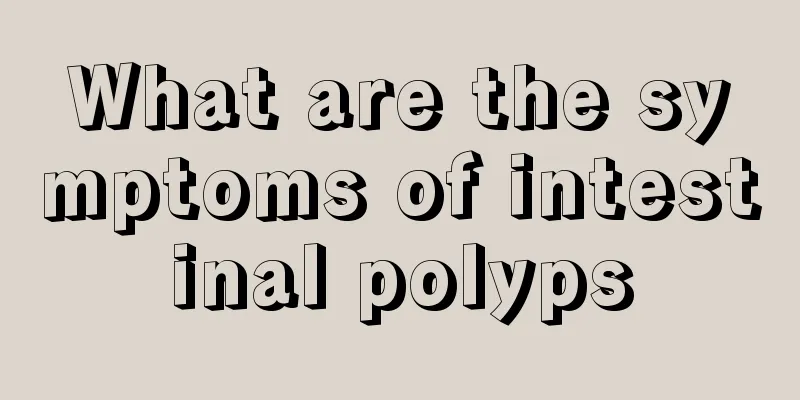What are the symptoms of intestinal polyps

|
In today's society, many people live with diseases. Because the rhythm of life is disordered, the irregular life of many people gives rise to many diseases. Gastrointestinal diseases are the most common diseases in life. The fast pace of life now makes many people just deal with diet, which is the primary cause of intestinal diseases. So, what are the symptoms of intestinal polyps? First, what are the symptoms of intestinal polyps? Generally speaking, for intestinal polyps, if the polyps are small and not numerous, there are usually no obvious symptoms in the early stages. However, a small number of patients may experience some symptoms, mainly manifested in the following three symptoms: blood in the stool. If it is a colon polyp, it is most likely to have blood in the stool. When blood in the stool occurs, many patients will think it is hemorrhoids, and thus fail to take timely prevention and treatment, which may bring greater harm. In fact, the symptoms of blood in the stool of hemorrhoids and intestinal polyps are different. The blood in the stool caused by hemorrhoids is mostly dripping after defecation, and the blood is bright red. It does not usually bleed, but for the bleeding caused by colon polyps, it is often mixed in the stool. Second, changes in bowel habits. When suffering from intestinal polyps, patients may experience changes in the time and frequency of bowel movements, or symptoms such as constipation and unexplained diarrhea. Especially if constipation and diarrhea occur alternately or are accompanied by abdominal pain, then you should pay attention, as you may have intestinal polyps and you should see a doctor in time for a diagnosis. Changes in stool shape. For normal and healthy people, stool should be cylindrical. However, if there are polyps in the colon cavity, they can compress the stool, causing the stool to become thinner or flat, and some may even have blood stains. What are the symptoms of intestinal polyps? This situation is relatively rare in patients with colon polyps. Generally speaking, it occurs in patients with more severe colon polyps. Larger polyps can cause intussusception, resulting in intestinal obstruction and abdominal pain. When polyps are large or numerous, gravity pulls on the intestinal mucosa, causing it to gradually separate from the muscle layer and prolapse downward. The traction caused by the patient's defecation movement and the stimulation of intestinal peristalsis can relax the mucosal layer around the base of the rectum, which may lead to rectal prolapse. When intestinal peristalsis pulls on the polyps, intestinal irritation symptoms may occur, such as abdominal discomfort, abdominal pain, diarrhea, bloody stools, tenesmus, etc. |
<<: What are the symptoms of muscle tension?
>>: What are the symptoms of muscle tear
Recommend
The efficacy of Red Rabbit Crystal
Red rabbit crystal is a kind of red crystal. It i...
How to diagnose early lung cancer? 3 diagnostic techniques for early lung cancer
When talking about cancer, many people often chan...
Here is a great way to avoid feeling sleepy while driving!
Tip 1: Chew sugar-free gum Chewing gum keeps your...
What to pay attention to about skin cancer
When skin cancer occurs, many patients are in gre...
Swollen eyelids and red bloodshot eyes
The phenomenon of swollen eyelids and red bloodsh...
Early prevention of nasopharyngeal carcinoma
The occurrence of nasopharyngeal cancer can cause...
Contraindications of influenza vaccine
Vaccines are mainly drugs developed to prevent ce...
Will lymphoma be inherited by the next generation?
A large number of medical practices have found th...
Does the child have sperm?
When men reach puberty, their bodies begin to mat...
How to grow yew bonsai
There are many benefits to placing more yew bonsa...
Teach you how to prevent thyroid cancer in your life
If you have awareness of disease prevention and p...
How long can lamb be kept frozen?
Mutton has been on the Chinese table since ancien...
What should you avoid in your diet for glioma
Brain glioma directly threatens the patient's...
What are the symptoms of lung cancer
What are the symptoms of lung cancer? The occurre...
Endometrial cancer screening items
As one of the most common malignant tumors of the...









